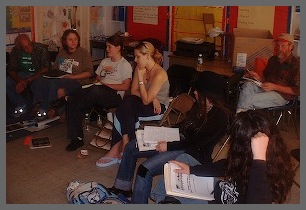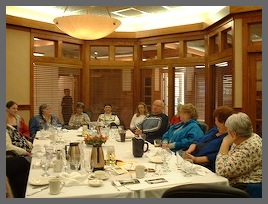Grassroots Organizing, Starting a Local Group
As you begin meeting people and distributing literature -- or becoming active in other community education efforts -- you're sure to meet individuals who feel and think the way you do. You don’t necessarily need to find lots of people before choosing some activities. Public meetings and other events need a small coordinating team, which can be two people.
From meetings should come larger support for the issue, until eventually there'll be increasing numbers of supporters and ability to persuade elected officials. It’s not an instant process, but you may find that much of your work along the way is rewarding and important.

Journey for Justice: New Orleans, LA 2003
You don’t have to formalize a ‘local group,’ but media, government, and other citizens will give more serious consideration and credibility to the views of a large, growing group. As you consider forming a local group, think first about the people who already offer you friendship and support. Family, friends, co-workers, teachers, supervisors, mentors and clergy are people likely to be in your current ‘social network.’
Make a list of people you know. Review it carefully, thinking about how each person might help you. Circle names of those you’ll talk with about forming a November Coalition (or allied) group in your neighborhood, city, state or region.

Journey for Justice: Council Bluffs, IA 2002
Find out if other organizations in your area are already working on some issues of drug war injustice. Add them to your list of people to contact. This list can serve as your first count of potential volunteers. If easily done, start talking to individuals face to face , or in an invitational letter, ask the others on your contact list to consider working with you to organize a local group.
If you have friends or associates who don’t know each other, invite each one to a "potluck" lunch or dinner where you'll "discuss an important issue that is close to your heart," or "of great concern." Or, best yet, tell them exactly why you're inviting them -- to discuss the possibilities of forming a citizen action group in your area, one that will challenge the injustice of the so-called war on drugs.
Within an intimate group you’ll probably meet one or two people immediately interested in working with you.
Now you have at least a group of two.
As you begin meeting people and distributing literature -- or becoming active in other community education efforts -- you're sure to meet individuals who feel and think the way you do. You don’t necessarily need to find lots of people before choosing some activities. Public meetings and other events need a small coordinating team, which can be two people.
From meetings should come larger support for the issue, until eventually there'll be increasing numbers of supporters and ability to persuade elected officials. It’s not an instant process, but you may find that much of your work along the way is rewarding and important.

Journey for Justice: New Orleans, LA 2003
You don’t have to formalize a ‘local group,’ but media, government, and other citizens will give more serious consideration and credibility to the views of a large, growing group. As you consider forming a local group, think first about the people who already offer you friendship and support. Family, friends, co-workers, teachers, supervisors, mentors and clergy are people likely to be in your current ‘social network.’
Make a list of people you know. Review it carefully, thinking about how each person might help you. Circle names of those you’ll talk with about forming a November Coalition (or allied) group in your neighborhood, city, state or region.

Journey for Justice: Council Bluffs, IA 2002
Find out if other organizations in your area are already working on some issues of drug war injustice. Add them to your list of people to contact. This list can serve as your first count of potential volunteers. If easily done, start talking to individuals face to face , or in an invitational letter, ask the others on your contact list to consider working with you to organize a local group.
If you have friends or associates who don’t know each other, invite each one to a "potluck" lunch or dinner where you'll "discuss an important issue that is close to your heart," or "of great concern." Or, best yet, tell them exactly why you're inviting them -- to discuss the possibilities of forming a citizen action group in your area, one that will challenge the injustice of the so-called war on drugs.
Within an intimate group you’ll probably meet one or two people immediately interested in working with you.
Now you have at least a group of two.